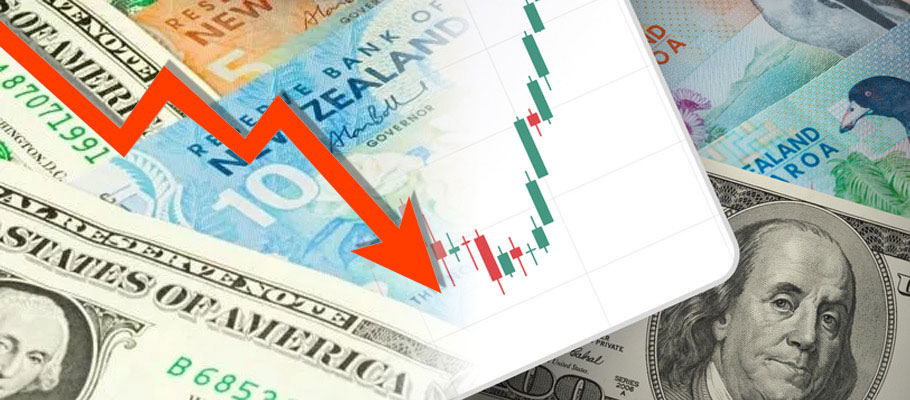
Published: March 26th, 2025
Figures from Statistics New Zealand released this week show that the island nation's economy grew by 0.7 per cent in the final quarter of 2024.
Confirmation that it had left a period of downturn behind should have bolstered NZD and given the Reserve Bank of New Zealand (RBNZ) cover to stop cutting interest rates. Yet traders seem intent on ignoring the good news.
The Pound-to-New Zealand Dollar rate (GBP/NZD) was up by half a percent on Monday, March 24th, reaching 2.2479. EUR/NZD was also 0.56% higher at 1.8849.
Analysts say an Australian Dollar sell off sparked by surprisingly poor labour market data is holding NZD back. An investor note from Commonwealth Bank of Australia said ‘NZD/USD dropped by close to 0.5 per cent in parallel with a lower AUD.’
On the same day New Zealand's quarterly GDP numbers were published, Australian employment data were released showing a significant 52.7k drop in February. Consensus was looking for a 30k lift.
The Down Under labour market data spurred traders to raise expectations for a faster cycle of interest rate cuts by the Reserve Bank of Australia (RBA).
The shift in posture has dragged Australian bond yields down, with a correlated effect on New Zealand bond yields. Both NZD and AUD have been pulled lower by dipping bond yields in their respective countries.
Overall, forex traders see slower Australian growth as a bad sign for New Zealand's economy, despite the upbeat Q4 GDP reading.
A market analysis by Auckland-based ASB said New Zealand's growth drivers in Q4 will struggle to sustain momentum given a backdrop of global headwinds.
The New Zealand Dollar is forecast to gain against most G10 majors into the middle of 2025, according to an analysis by Sydney-based Westpac.
An improving international growth backdrop and a US Dollar set to trend lower will benefit the Kiwi, though Westpac analysts say forex traders should also watch for an uptick in New Zealand's economic growth as the Reserve Bank of New Zealand's (RBNZ) current policy of restrictive interest rates could loosen in the next few months.
‘Auckland central bankers started the RBNZ's easing cycle ahead of some G10 peers and seem intent on moderating that approach ahead of what traders had expected. There has been a notable loosening of financial conditions as retail and wholesale interest rates have moved to levels not seen in years,’ Westpac wrote.
Despite past signals to the contrary, the RBNZ is now thought to be comfortable with relaxing interest rates on an accelerated timeline. ‘As headline CPI inflation is predicted to stay around the mid-point of policymakers' 1-3 per cent target range during the third quarter, the RBNZ sees an environment where they have more freedom to respond to weakening economic indicators.’
Financial conditions in New Zealand have eased notably in recent weeks, with short-term swap rates falling to around 100 basis points, while mortgage rates have dropped by 50-100 basis points.
Westpac analysts believe the RBNZ will likely announce two 25 basis point cuts in its two remaining 2024 meetings. The path for 2025 is naturally more speculative.
In March 2024, analysts at two of The Netherlands' largest banks said the Kiwi was on track to be one of the year's outperformers, despite a recent string of losses.
NZD lost ground against other majors in February after Auckland central bankers held the official interest rate at 5.50%, disappointing some forex traders who were counting on another near-term rate hike. Guidance from the Reserve Bank of New Zealand's (RBNZ) February meeting prompted a selloff and reappraisal of New Zealand interest rate prospects, with bets firming up for a new round of cuts in the Autumn.
In a note to investors, ING Bank's FX Strategy Unit wrote that the RNBZ's statement was ‘less hawkish than expected given that another rate hike looks to be off the table for the foreseeable future. The immediate result has been losses for the New Zealand dollar.’
But ING added that traders ‘shouldn't buy into perceptions of NZD weakness. Over at fellow Dutch banking giant ABN AMRO, currency analysts are in broad agreement. A market analysis published this week says the New Zealand dollar is still on track to outperform’ in 2024.
The New Zealand Dollar fell when the RBNZ cut its own official interest rate forecasts from 5.69 per cent in November 2023 to 5.60 per cent in February 2024, reducing the implied probability of a rate rise to below 40 per cent.
A statement from the central bank after its scheduled February meeting used softer language to describe the likelihood of additional tightening, prompting traders to price-in 2024's first rate cut for September.
At the end of November 2023, the New Zealand Dollar was the best-performing major currency thanks to positive global market conditions, new measures by China to kick-start the country's slumbering economy, and a recent print of upbeat retail sales figures.
A market analysis from Crédit Agricole's Currency Strategy Unit said rising New Zealand retail sales had made the Kiwi the G10's top performing currency for the month of November.
Figures from Stats NZ showed that Q3 2023 retail sales volumes hit zero per cent quarter-on-quarter, much higher than the negative -0.8 per cent consensus was looking for and sharply up from Q2's negative -0.9 per cent.
The numbers provided some hope that the GDP print due for publication on 14th December would come in above expectations, likely giving NZD another boost. But the bank also pointed to global drivers as key to the Kiwi's upward momentum, given that November was also shaping up to be the best month of the year for global stock markets.
Upbeat investor sentiment tends to be supportive of the New Zealand Dollar and helped it advance against all G10 peers in late 2023 except the Swedish Krona.
The Kiwi also extended its short-term strength thanks to good news out of China, where Beijing announced fresh measures to boost the domestic property sector.